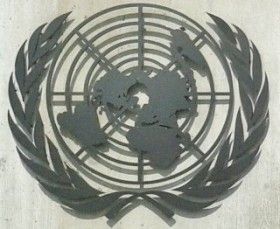Next step towards an updated version of the UN Standard Minimum Rules for the Treatment of Prisoners
1st April 2014

An important step towards a revised set of the 1955 UN Standard Minimum Rules for the Treatment of Prisoners as described by PRI’s Policy Director, Andrea Huber and Programme Officer, Olivia Rope who attended the third Expert Group Meeting on the revision process in Vienna last week.
Last week Penal Reform International attended the 3rd Intergovernmental Expert Group Meeting on the revision of the UN Standard Minimum Rules for the Treatment of Prisoners. The meeting in Vienna brought together delegations from some 60 countries for the start of negotiations on a revised set of Rules. International organisations and civil society also participated in the meeting.
The Standard Minimum Rules for the Treatment of Prisoners from 1955 provide global and authoritative guidance to prison administrations and staff and are often described as the ‘blueprint’ for prison management. In 2010, recognising the importance of the Rules, the UN General Assembly requested the establishment of an Expert Group to look at modernising the Rules and bringing them into the 21st Century by updating them so that they reflect current international standards and advances in correctional science since 1955.
While negotiations last week in Vienna were too protracted to cover all areas identified in previous meetings for revision by the Expert Group, and full agreement on text was only achieved for a few provisions, the meeting nonetheless marked an important junction in the process. It saw an increased consensus at the international level of the necessity to review the Rules and a cross-regional commitment to engage in the updating of this text in a careful and methodical way. The US delegation, for example, stressed that states have ‘an opportunity to make a significant contribution’ to Rules which both Member States and international organisations have a huge interest in. Japan described the undertaking as ‘strengthening a very important document for corrections’. China stressed the ‘very important mandate’ of the Expert Group and Austria pointed to the fact that the Rules are important to individual fates all over the world.
South Africa underlined that the revision process of the Standard Minimum Rules is ‘history in the making’.
Several areas were discussed including healthcare, the rehabilitative purpose of imprisonment and disciplinary measures, with agreement reached on a recommendation for revised text for a number of Rules falling within these areas. For other Rules, the Expert Group discussed elements of Rules to be revised but did not achieve consensus so left the text open for further discussion.
Concrete and remarkable progress was achieved with the negotiation of an agreed new Rule on body searches, the very first provision in international standards envisaged to give guidance to prison administrations on when, how and by whom body searches of prisoners are permissible.
As searches are carried out in an arbitrary, systematic or humiliating manner in many prisons across the globe, explicit regulation of body searches could have a real impact on the prevention of inhuman or degrading treatment. A further provision relating to searches of visitors is also envisaged, with an initial text discussed in Vienna.
The proposed new Rule 34bis on searches would provide that laws and regulations governing searches of prisoners and cells shall be in accordance with international law and respect the principles of proportionality, legality and necessity. It shall be conducted in private by ‘trained staff of the same sex’ and ‘in a manner that respects the dignity and privacy of the individual being searched’. Explicitly the new provision would provide that searches shall ‘not be used to harass, intimidate or unnecessarily intrude upon a prisoner’s privacy’. It also states that, ‘For the purpose of accountability, the prison administration shall keep appropriate records of searches, in particular strip and body cavity searches and searches of cells, as well as the reason for these searches, the identities of those who conducted them and any results of the searches.’ Also it would prescribe that, ‘Intrusive searches, including strip searches and body cavity searches, should only be undertaken if absolutely necessary’ and institutions ‘shall be encouraged to develop and use appropriate alternatives to develop and use appropriate alternatives to intrusive searches’.
Ahead of the meeting, PRI together with Essex University submitted the second report based on substantive recommendations of a group of independent experts on how to update the Rules to be in line with international standards that have evolved since the Standard Minimum Rules were adopted nearly 60 years ago. Read the two papers from the ‘Essex Expert Group. This second report added to a first submission on recommended changes, including, among others, a recommendation to incorporate a provision on searches into the Standard Minimum Rules.
For more information on the process read a Joint NGO briefing which outlines the different steps in the process to-date and submissions made by international bodies, including by the Special Rapporteur on torture who dedicated his 2013 report to the UN General Assembly to the review of the Standard Minimum Rules.
For the full documentation of the intergovernmental expert group, including all state submissions, submissions of NGOs and of IGOs see: www.unodc.org/unodc/en/justice-and-prison-reform/expert-group-meetings6.html